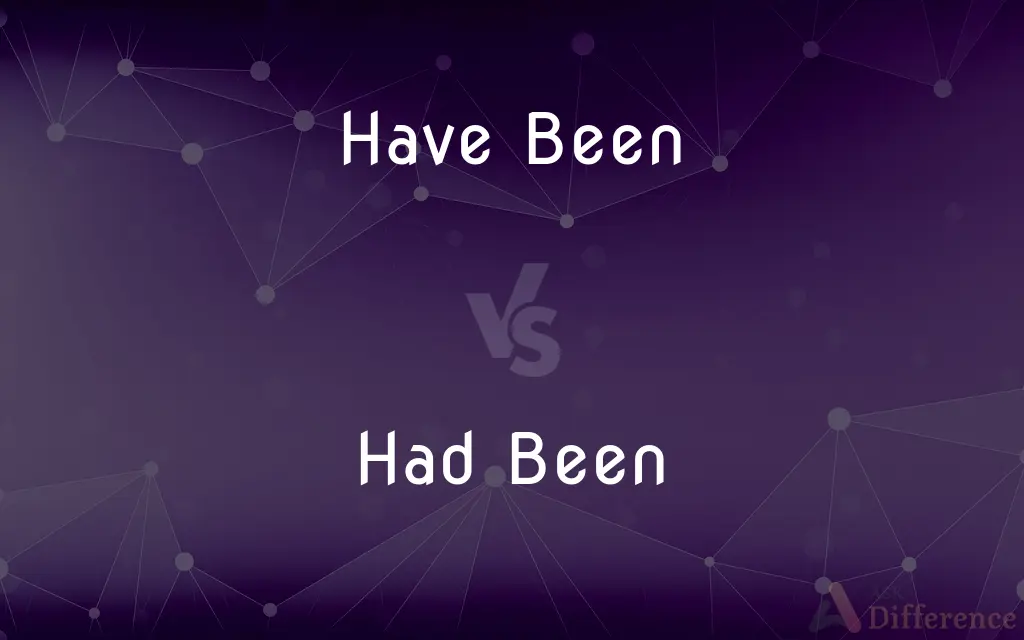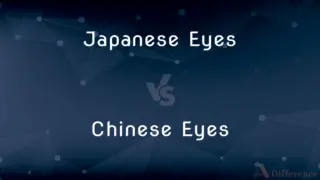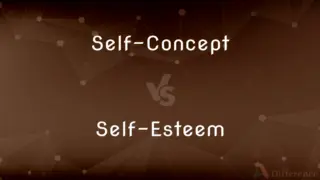Have Been vs. Had Been — What's the Difference?
By Tayyaba Rehman & Fiza Rafique — Published on October 24, 2023
"Have been" is present perfect tense, indicating a connection from the past to the present. "Had been" is past perfect tense, showing an action completed before another past action.

Difference Between Have Been and Had Been
Table of Contents
ADVERTISEMENT
Key Differences
"Have been" is used in the present perfect tense to convey actions that started in the past and have relevance or connection to the present. It indicates a continuum. For instance, if someone says, "I have been working," it implies they started working in the past and are possibly still working or just finished.
On the other hand, "had been" functions in the past perfect tense. It's employed to discuss an action or state of being that happened and was completed before another past action. If someone states, "I had been working when she called," this means they were already working (a past action) when a subsequent action (the call) took place.
When utilizing "have been," it's common to refer to experiences, changes, or continuing situations. For example, "They have been to France" doesn't specify when, just the experience of visiting. "Had been," conversely, is used when clarifying the chronological order of past events.
Moreover, while "have been" connects past actions to the present, emphasizing the result, continuation, or relevance of the action, "had been" focuses strictly on the sequence of past actions, offering depth and clarity to narratives.
Lastly, it's essential to recognize the practical applications of these tenses. "Have been" might be used in situations where the exact timing isn't vital, but the experience is. "Had been," however, provides a clearer picture of events in a sequence, ensuring a reader or listener can follow along with a story or explanation.
ADVERTISEMENT
Comparison Chart
Tense
Present Perfect
Past Perfect
Time Reference
Connects the past to the present.
Refers to an action completed before another past action.
Example
I have been reading.
I had been reading when he arrived.
Usage
Emphasizes the result, continuation, or experience.
Clarifies the order of past actions.
Function
Shows actions or states with relevance to now.
Shows actions or states preceding other past actions or states.
Compare with Definitions
Have Been
Emphasizes the result of an action.
They have been preparing, and now they're ready.
Had Been
Emphasizes completion before another past occurrence.
They had been discussing it before I joined the meeting.
Have Been
Denotes experiences without specific time.
She has been to Spain multiple times.
Had Been
Refers to an action preceding another past event.
She had been living there before she moved to the city.
Have Been
Describes changes over time.
Prices have been rising.
Had Been
Gives background information in narratives.
He had been a teacher, which explained his patience.
Have Been
Indicates an ongoing action started in the past.
I have been studying for hours.
Had Been
Describes a condition in place at some past moment.
If she had been aware, she would've acted differently.
Have Been
Shows a continuing situation.
We have been living here for ten years.
Had Been
Indicates an action was ongoing and then completed in the past.
I had been waiting for an hour when he finally arrived.
Common Curiosities
When should I use "have been"?
Use "have been" for actions that started in the past and continue to the present or have relevance now.
Can "had been" refer to a recent action?
"Had been" refers to an action that was completed before another past action or event.
What tense is "have been"?
"Have been" is present perfect tense.
what tense is "had been"?
"Had been" is past perfect tense.
Which emphasizes sequence in the past?
"Had been" emphasizes sequence or order of past actions.
Is "had been" used for hypothetical situations?
Yes, it's often used in third conditional sentences to describe unreal past conditions.
Are both "have been" and "had been" forms of the verb "to be"?
Yes, they are both forms of "to be" combined with "have" or "had".
Does "have been" always indicate ongoing actions?
Not always; it can indicate experiences or states that are relevant to the present.
Which one, "have been" or "had been", is more specific about timing?
"Had been" is often more specific, clarifying the order of past actions.
How does "had been" relate to storytelling?
"Had been" provides background and sets the sequence of events in narratives.
Can "have been" refer to a finished action?
Yes, if the action's relevance or effect continues to the present.
Can "have been" indicate an experience?
Yes, it can indicate experiences without specifying exact timing.
Do both "have been" and "had been" need a main verb following them?
Generally, yes, they're followed by a main verb in its past participle form.
When should I avoid using "have been"?
Avoid "have been" when discussing actions with a definite start and end in the past with no connection to the present.
Can "had been" describe a temporary state in the past?
Yes, it can describe states or actions that were temporary and preceded other past events.
Share Your Discovery

Previous Comparison
Japanese Eyes vs. Chinese Eyes
Next Comparison
Self-Concept vs. Self-EsteemAuthor Spotlight
Written by
Tayyaba RehmanTayyaba Rehman is a distinguished writer, currently serving as a primary contributor to askdifference.com. As a researcher in semantics and etymology, Tayyaba's passion for the complexity of languages and their distinctions has found a perfect home on the platform. Tayyaba delves into the intricacies of language, distinguishing between commonly confused words and phrases, thereby providing clarity for readers worldwide.
Co-written by
Fiza RafiqueFiza Rafique is a skilled content writer at AskDifference.com, where she meticulously refines and enhances written pieces. Drawing from her vast editorial expertise, Fiza ensures clarity, accuracy, and precision in every article. Passionate about language, she continually seeks to elevate the quality of content for readers worldwide.












































